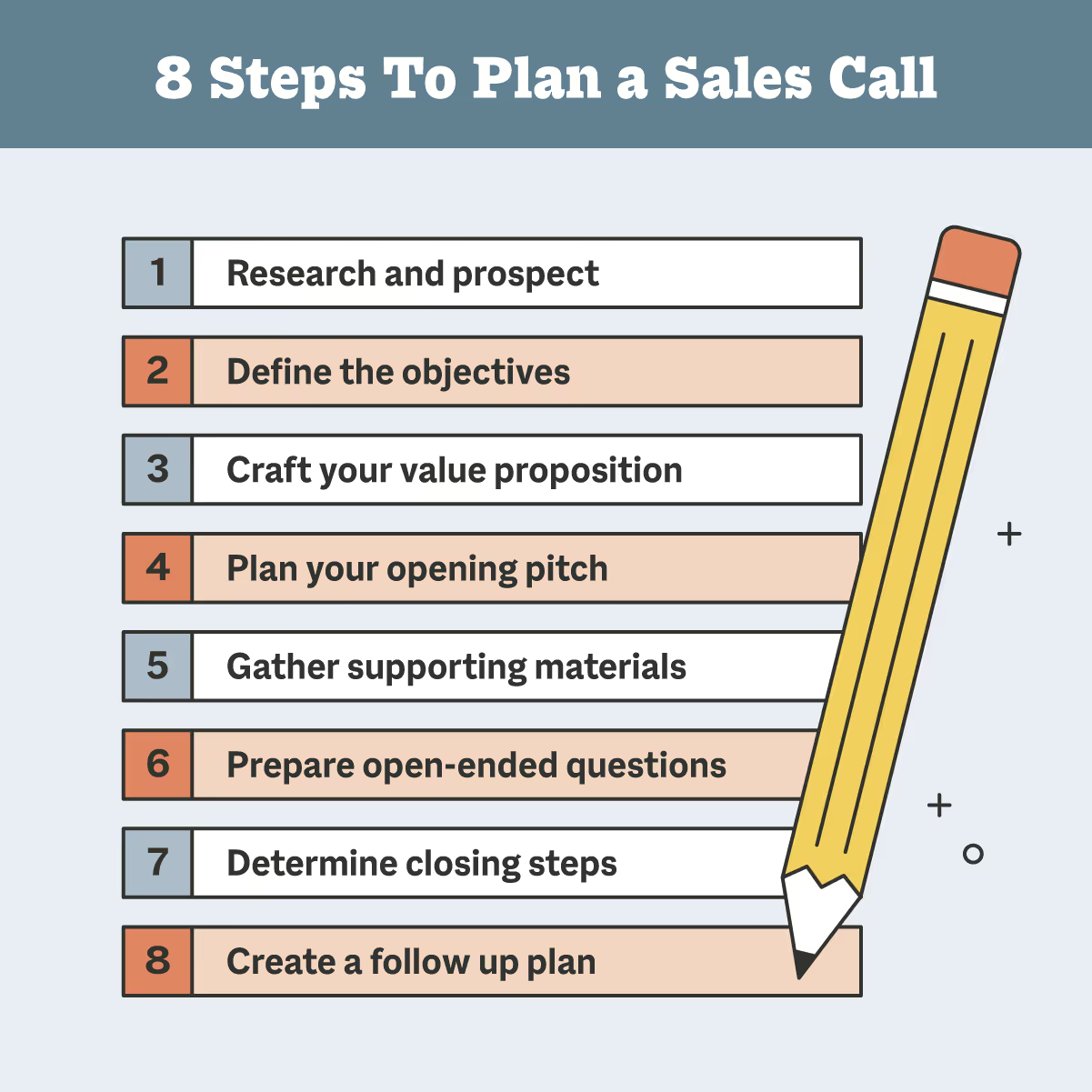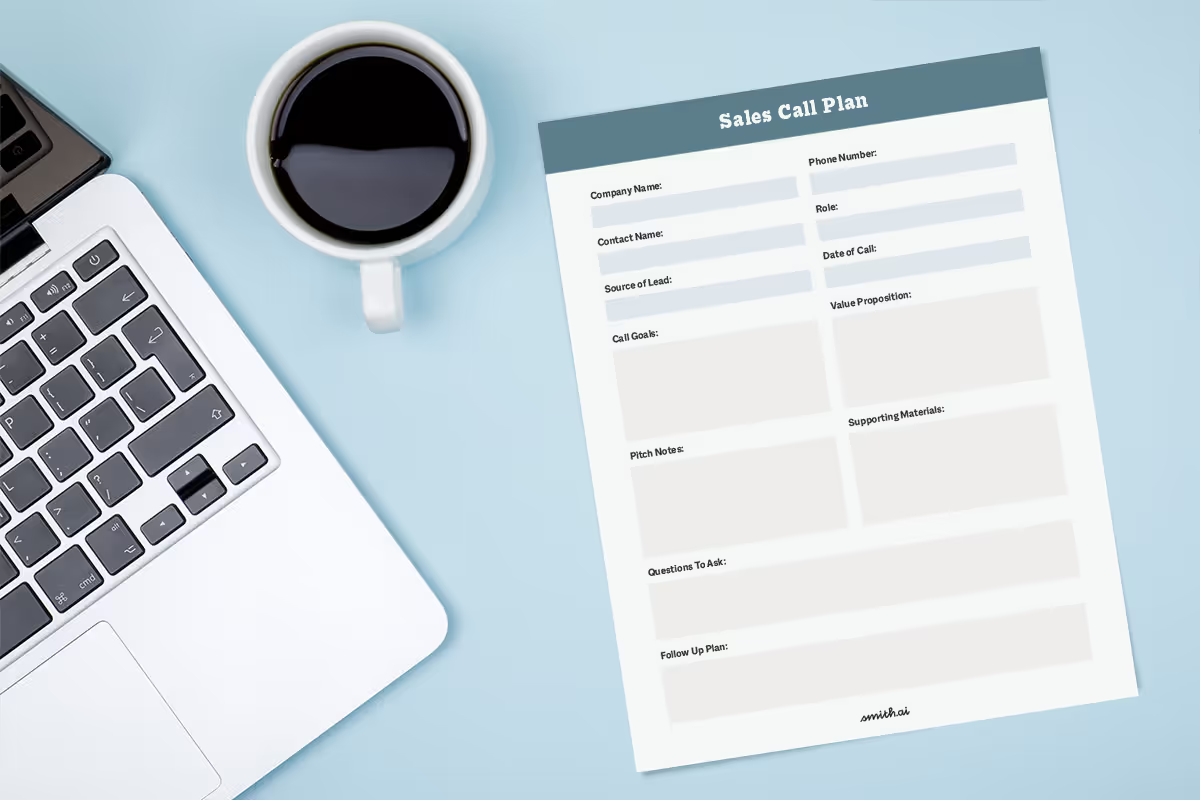The Ultimate Guide to Effective Sales Call Planning + Template
The Ultimate Guide to Effective Sales Call Planning + Template

Effective planning is a critical component of achieving success in sales, yet it’s frequently undervalued. Surprisingly, a staggering 82% of B2B decision-makers believe that sales representatives are unprepared before engaging in a sales call.
Successful salespeople, like our outreach campaign agents, understand that relying on instincts or improvisation doesn't lead to met quotas or healthy close rates. While adaptability is important, a solid sales call plan serves as a strong framework for securing deals.
In this post, we’ll highlight the significance of sales call planning and guide you through the necessary steps to develop an effective sales call plan of your own.
And make sure to check out our free downloadable sales call plan template to help you get started.
The importance of sales call planning
A sales call plan outlines goals, strategies, and tactics for salespeople before engaging with leads or customers. It essentially serves as a roadmap to ensure a structured and effective sales conversation — whether that be over the phone or in a live or virtual meeting.
It involves preparing and strategizing before making a sales call to ensure the conversation is productive and has the best chance of achieving the desired outcome. Here are some reasons why sales call planning is important:
Maximizes efficiency
Planning ahead enables salespeople to optimize their time and resources. By defining call objectives, researching leads or prospects, and preparing relevant materials, sales professionals maximize their limited call time.
Builds confidence
By being prepared, salespeople enter calls with clear goals and conversational strategies, which are crucial for fostering trust and credibility with prospects. This confidence can greatly influence call outcomes.
Tailors the approach
Planning enables salespeople to personalize their approach to each unique sales call. By preemptively understanding the prospect's pain points, industry challenges, and likely objections, sales professionals can customize their messaging, solutions, and value proposition to effectively address those specific concerns.
Increases sales conversion
Effective planning and preparation improve the chances of successfully moving prospects through the sales process. By aligning the sales call objectives with the buyer's journey, understanding their needs, and tailoring the pitch accordingly, salespeople can increase their conversion rates and close more deals.
Improves time management
Planning helps sales professionals in efficient time allocation by prioritizing high-potential prospects and identifying crucial call topics. This prevents wasting time on irrelevant matters or prospects that aren’t a good fit.
Overall, a sales call plan is essential for maximizing the effectiveness of sales efforts, improving communication, and increasing the likelihood of achieving desired outcomes. It empowers salespeople to be better prepared, confident, and focused, leading to improved sales performance and customer satisfaction.
How to plan a sales call
Planning a sales call involves several steps that can help you prepare and maximize your chances of success. Here's a general guide on how to plan a sales call:

Step one: Research and prospect
The first step to a successful sales call plan is to research and gather information about your prospect before the call. Create a prospect list to gather information about businesses or contacts that fit your ideal customer profile. This could include the prospects:
- Industry
- Company
- Role/position
- Pain points
- Competitors
- Goals
This knowledge will enable you to tailor your approach and demonstrate your understanding of their specific needs.
Step two: Define the objectives
The next step is to define the purpose of the call and establish clear objectives. Determine what you want to achieve, whether that be closing a sale, building rapport, gathering information, or setting up a follow-up meeting. Having specific goals will guide your conversation and help measure your success.
Step three: Craft your value proposition
Develop a compelling value proposition that highlights the unique benefits and solutions your product or service offers. Clearly articulate how it addresses your prospect's pain points and delivers value. This will form the core of your sales pitch during the call.
Step four: Plan your opening pitch
Prepare a strong opening to grab the prospect's attention and create a positive first impression. You’ll want to introduce yourself, but you’ll also want to hook them with some type of important information you learned from step one. Some ideas include:
- A common connection that referred you to them
- A similar company you’ve helped in the past
- A problem they’ve recently encountered
- New trends that are relevant to their industry or customers
Make sure that your opening hook is tailored to your prospect, making it relevant and seamlessly guiding the conversation towards the purpose of your call—the moment to deliver your sales pitch.
Step five: Gather supporting materials
Depending on the nature of your sales call, gather any relevant materials or resources that can support your pitch. This could include:
- Case studies
- Testimonials
- Reviews
- Product demos
Ensure that the social proof you provide is relevant to the current situation that your prospect is experiencing. Be ready to share or reference these materials during the call.
Step six: Prepare open-ended questions
While it’s natural to aim to persuade your prospect about the value of your offering, it’s essential to keep in mind that the focus of the call should be on their needs and interests, rather than solely on your own agenda.
Open-ended questions play a crucial role in a sales call plan because they encourage the prospect to provide detailed responses and share valuable information.
Here are 10 examples of open-ended questions you can ask:
- "Can you tell me about your current challenges or pain points in [specific area relevant to your product/service]?"
- "What goals or objectives are you trying to achieve in [specific area relevant to your product/service]?"
- "How do you currently handle [specific task or problem] within your organization?"
- "What factors are most important to you when considering [product/service category] solutions?"
- "Can you provide some insight into your decision-making process when it comes to [specific area relevant to your product/service]?"
- "What would a successful outcome look like for you in terms of [specific desired result]?"
- "Why do you need to solve this problem now? And what will happen if you don’t?"
- "What type of investment are you able to allocate toward [product/service]?"
- "How do you envision our [product/service] integrating with your existing systems or processes?"
- "What concerns, if any, do you have about implementing a new [product/service]?"
Remember to actively listen to their responses, ask follow-up questions, and use the information they provide to further tailor your pitch and demonstrate how your product or service can address their specific needs and challenges.
Step seven: Determine closing steps
Plan the desired outcome or next steps for the call. Decide what action you want the prospect to take, whether it's scheduling a follow-up meeting, committing to a purchase, or moving to the next stage of the sales process. Craft a concise and compelling closing statement to guide the conversation towards your desired outcome.
Step eight: Remember to follow up
Prepare a follow-up plan to continue the sales process after the call. Determine the appropriate actions to take, such as sending a personalized follow-up email, scheduling a meeting, or providing additional information. Promptly follow up to maintain momentum and build a strong relationship with your prospect.
Template for planning a sales call
If you want to enhance your sales strategy and maximize your success, this sales call plan template provides a structured framework for planning and executing effective sales calls.
Whether you're a seasoned sales professional or just starting out, this tool is a valuable resource that will help you organize your thoughts, set clear objectives, and guide your conversations with prospective clients.


Smith.ai can handle your sales outreach calls
Staying organized is crucial for success in sales. By implementing a sales call plan, you can streamline your approach, stay focused on your objectives, and increase your chances of closing deals.
However, if you find yourself overwhelmed with the demands of making calls and managing outreach, you don't have to do it alone.
Consider enlisting the help of our sales agents who can serve as your dedicated outreach team. With our expertise and the power of custom AI-driven workflows, we can handle your sales calls, follow up with leads, and maximize outcomes for your business.
Take advantage of this professional support and watch your sales soar while you focus on other critical aspects of your business. To learn more about what our virtual receptionists, live chat, and outreach campaigns can do for your business, book a consultation today.
Take the faster path to growth. Get Smith.ai today.
Key Areas to Explore

Your submission has been received!











%20(1)%20(1).avif)


.svg)



